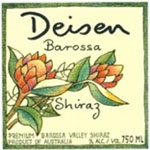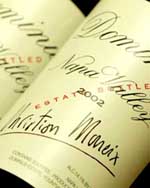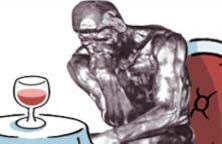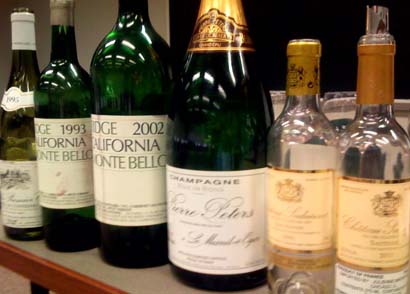Dr Vino's wine blog
wine talk that goes down easy
Ten more reasons to take my class this Friday
 We’re less than a week until Friday 12/14! What’s that, you ask? Why, it’s the day of my holiday wine class at the so-new-it’s-not-even-open Astor Center! With only nine seats remaining, it’s time to buy tickets before they’re gone so you can swirl and spit (or not) seven great wines. Oh, and here are some more reasons why you should:
We’re less than a week until Friday 12/14! What’s that, you ask? Why, it’s the day of my holiday wine class at the so-new-it’s-not-even-open Astor Center! With only nine seats remaining, it’s time to buy tickets before they’re gone so you can swirl and spit (or not) seven great wines. Oh, and here are some more reasons why you should:
* It’s more fun than sitting at home watching re-runs on TV during the writers’ strike!
* Being able to know which end of the bottle to open the only prior wine knowledge needed!
* Robert Parker will make an appearance and I will thumb wrestle him!
* Get a gilt-edged, collectors’ edition of Dr. Vino’s holiday wine survival guide!
* Isiah Thomas will stop by and reveal his master plan of how the Knicks will become NBA champions this year!
* Find some excellent wines to give as gifts to your friends and co-workers–and buy them with a discount!
* Find out which wine is the perfect match for roaring fires and chestnuts!
* Discover the perfect wine pairing for the weather condition known as “wintry mix”!
* Meet fellow wine enthusiasts!
* Find out which vineyard Brangelina are buying together with Jennifer Aniston!
All right, some of these may be true and some may be totally made up. Stop by and find out the truth for yourself!
Buy tickets in advance here
Friday, Dec 14, 6:30 – 8:00 PM, 23 E. 4th Street (at Lafayette, above Astor Wine & Spirits)
Magnums, what are they good for, Terry Theise?
Is bigger better?
This perennial question came up during my class on Saturday at the University of Chicago. In this context, it related to bottle size, specifically, magnums.
The tasting had two magnums, one of Pierre Peters, “cuvee de reserve” Champagne and another of Ridge Monte Bello 2002. How sweet it is to organize tastings!
Anticipating the question of size, um, arising, I asked none other than the importer of the champagne, Terry Theise, via email beforehand. Here is his reply (reproduced with permission): Read more…
Liquid assets: manage your cellar
Devise a strategy for all that surplus wine! This month in Chicago and New York, I’ll be leading classes on collecting, the wine auction market and how to strategize for investing or enjoyment. Both locations will have tastings of collectible wines.
We’ll do one marathon session at the University of Chicago on Sep 29. (details and registration)
Starting on September 25, we’ll spread it out over three Tuesday evenings at New York University’s Torch Club. (details and registration)
Only five spots are left in Chicago and a few more in NY so sign up now or never! Hope to see you there.
Connect with Dr. Vino offline!
 * Slow Food Westchester: July 25, 6 – 8 PM. I’ll be helping out with the inaugural event for this chapter (convivium). We’ll taste seven great wines that also happen to be some hue of “green.” Plates restaurant, Larchmont, NY. $40, reservations necessary. Call Plates to reserve: 914.834.1244
* Slow Food Westchester: July 25, 6 – 8 PM. I’ll be helping out with the inaugural event for this chapter (convivium). We’ll taste seven great wines that also happen to be some hue of “green.” Plates restaurant, Larchmont, NY. $40, reservations necessary. Call Plates to reserve: 914.834.1244
* New York University: Buying and Cellaring, three sessions starting on September 25. Register here
* University of Chicago: Buying and cellaring liquid assets: one monster session, September 29. Register here
In both of these new classes, we will examine the red hot wine market. We will discuss where to buy wines, where to sell, how to store, and when to consume wines. In the longer, NYU course, we will devise a buying strategy for your budget and storage conditions and I hope we’ll be able to do the same in Chicago, even though the time is more limited. Both NY and Chicago will have tastings of collectible wines so be sure to sign up–especially, since the people enroll, the bigger the tasting budget is!
* New York Unversity: Becoming a Wine Expert. Six Wednesday evenings, starting October 17. Register here
This spring, one participant in the course said that he had waited two years to get into the class — I hope it was worth it! This, my core class, has the enrollment limited to 25 because of space limitations at the Torch Club.
 * The Gourmet Institute: New York City, October 19-21. Register here
* The Gourmet Institute: New York City, October 19-21. Register here
I’ll be participating on the panel “Eat the Web: Blogging’s Effect on the Food World,†moderated by Ruth Reichl. It’s very expensive (think two iPhones) but there are all those celebrity chefs whose food you can eat!
And I’m trying to coordinate an offline meetup, hopefully for next week…More on that very soon.
At Dr. Vino classes, find more than fine wine!
As we went around the room to introduce ourselves at my University of Chicago class on Saturday afternoon, one participant had a surprising tale to share with the class.
He said that he and the woman to his right had taken my class there on October 1, 2005 on the politics of wine in Chile, Argentina, and Spain. He remembered the date because it was his birthday. But he also remembered it because he and the woman met that day and they had been “drinking wine together ever since.”
Food and wine pairing? Forget it! They got a life pairing!
Critiquing the critics
On Saturday at the University of Chicago, we had a fun time “critiquing the critics.” We discussed what is certainly one of the hottest hot-button issues in wine, the use of scores, and assessed a variety of other ways for evaluating wine. We tasted our way through ten wines and munched through some artisanal cheeses and breads.
The wines were from a range of styles and included bubbly, red and white. Some of the faves were:
* Bisol prosecco, NV (about $13; find this wine). Controversy came with this wine with high praise from Wine & Spirits (93 points) and faint praise wine Wine Spec (86 points). The yummy sparkler got a thumbs up from the group.
* William Fevre, Vaudesir, Grand Cru Chablis, 2004 (about $45; find this wine). I didn’t even realize that Rovani/Parker tasted Chablis but Rovani slapped a 93 on this one. ‘Tis good. Wonderful minerality with delicate acidity, which makes for a very nice mouthfeel and it has an excellent finish. No unanimity on this wine to be sure, with others preferring the American chardonnay, but I thought it was excellent, if pricey.
 * Deisen, shiraz, Barossa, 2002 (about $50; find this wine). A brawny shiraz from down under with 15% alcohol. Parker 94. The class loved it with no dissenters. While the wine is very user friendly as far as shiraz-ma-taz is concerned, I found the alcohol to be somewhat off-putting.
* Deisen, shiraz, Barossa, 2002 (about $50; find this wine). A brawny shiraz from down under with 15% alcohol. Parker 94. The class loved it with no dissenters. While the wine is very user friendly as far as shiraz-ma-taz is concerned, I found the alcohol to be somewhat off-putting.
* Castano, Hecula, monastrell, 2004. (about $10; find this wine). This is a darned good value vino since many participants thought it was at least $30. It’s got hints of that mourvedre gamey-ness and I think it could do with a few years in the cellar to tame it a bit. But still, it’s vigor would be great with game or grilled meats.
 * Dominus, Napa, 2003 (about $100; find this wine) This was the most critically contested wine of the day with a huge spread between Parker’s 95 and the Wine Spec’s Jim Laube zinging it with an 81 (a score so low that the Wine Advocate would not even publish it). Laube didn’t even grumble about TCA, the usual cause of his zingers, simply going with the “disappointingly dry and austere.” I poured it blind and there were lots of pros and only two cons before I revealed the “controversy.”
* Dominus, Napa, 2003 (about $100; find this wine) This was the most critically contested wine of the day with a huge spread between Parker’s 95 and the Wine Spec’s Jim Laube zinging it with an 81 (a score so low that the Wine Advocate would not even publish it). Laube didn’t even grumble about TCA, the usual cause of his zingers, simply going with the “disappointingly dry and austere.” I poured it blind and there were lots of pros and only two cons before I revealed the “controversy.”
It was a hedonistic afternoon. If you’re interested, there may be a couple of spaces left for my next class in May. Hope to see you there!
Put your money where your mouth is
 Eric Asimov’s trying to eliminate my job!
Eric Asimov’s trying to eliminate my job!
In his column yesterday (which is currently the #3 most emailed on the site), the NYT chief wine critic and chief wine blogger says that the best thing for wine newbies to do is find a trusted wine shop and put $250 of your wine budget in their hands and walk out with a case of wine. It’s better than even taking a class he argues.
As a wine educator (with three classes this week), I have to object! But he does make a good point–two good points, actually.
First, my objection. In my classes, I select wines, organize them thematically or stylistically, pair them with food (granted, just cheese, bread, and occasionally olives not a full meal), show maps, images, and talk about the politics, people and history of a wine. We also talk about how to find the best wine buys locally, wine-friendly restaurants, where to taste wines for free, how to serve, and much more. The two hours fly by. And all participants get to talk, sip, and discuss, so there is a social aspect as well. So don’t write off classes too quickly, even for newbies! They can have much to offer.
But Asimov still has a fundamentally good point: there’s no substitute for learning through tasting. Not everyone will have wine classes available near them or perhaps the time to take a class so then I absolutely agree that you should put your money where your mouth is via a local retailer. This lowers the barriers of entry so that anybody can do it, regardless of level of wine geekdom.
The second good point that Asimov makes is to trust a local retailer, hopefully two retailers. Why? Well, for one, they have the wines available to sell you. Many times you can read about great sounding wines on the web or in print but then you can’t find them near you. Trusting the retailer doesn’t lead to that frustration.
Moreover, you can have feedback. Unlike a critic whom you may never meet, you might visit your retailer once a week or once a month. So there’s accountability. They want to make you happy and keep you coming back, not sell you wine a hedonistic fruit bomb if your preferences run more toward the earthy and the minerally.
But one subtle distinction: the custom case is the way to go over the pre-fab case. Many wine shops put together cases at various price points or for different flavor preferences. While these sometimes can be good, I’m always leery that they are putting wines that need to “move” in such cases. When you choose a staffer to put together your case for you, not only is it more customized, but it’s more likely to be wines chosen simply on their merits, rather than economic reasons.
So, why are you still in front of your computer? Get thee to a shop!
Related:
“Add some juice to your wine dollar: buying tips” [Dr. V]
“Making a case: 12 gift wines” [Dr. V]
Wine classes in Chicago and New York
Geography is now less of an excuse for not taking a wine class with me this spring!
Critiquing the critics, University of Chicago, 4/14, 2:30 – 6:30
We review different styles of wine evaluation culminating with YOU being the critic in our tasting. Details and registration
 Red, white, and green wine, University of Chicago, 5/12, 2:30 – 6:30
Red, white, and green wine, University of Chicago, 5/12, 2:30 – 6:30
While organic food is all the rage, organic wine has arguably lagged behind. We assess the various shades of “green” wine and then put our knowledge to the test and see if we can taste the difference. Details and registration
Wine emergency! How to navigate a wine list, NYU, 3/22 6:30 – 8:30
The business dinner. The big date. Avoid making them a wine emergency as we navigate wine lists–and taste!–with confidence. Details and registration
I hope to see you at one of these one-day sessions! News of a Chicago meetup forthcoming…
 tags: wine | wine classes
tags: wine | wine classes




